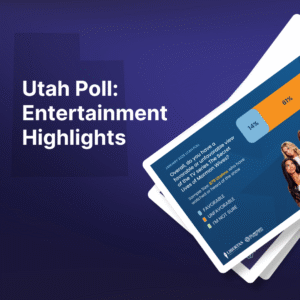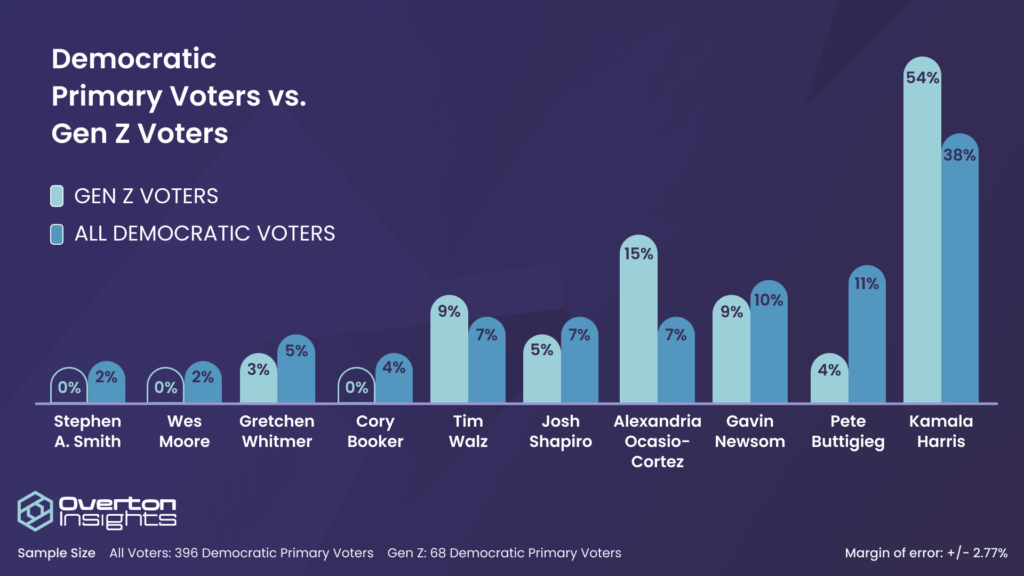
Utah Poll: Cultural Divides Emerge in Utah’s Entertainment Preferences
Utah voters have mixed opinions on sports franchise growth and changes, the 2034 Olympic logo, and the Secret Lives of Mormon Wives reality tv show

Poll Analyst
olivia@overtoninsights.com
The following data come from the July 2025 Overton Insights Poll (June 23–26, 2025, MOE ±2.77%), conducted among 1,200 registered voters nationwide.
Many young voters transcend traditional partisan boxes. With 40% of Gen Z identifying as ‘politically homeless,’ a third-party candidate may be welcome. Among the other 60% of Gen Z, 25% identify with the Republican Party and 40% the Democratic Party.
While young voters are traditionally considered a progressive demographic, many Gen Z Democrats appear disconnected from their party. The majority of young Republicans; however, do consider themselves connected to the GOP.
Among Gen Z Democrats:
Among Gen Z Republicans:
Perhaps a contributing factor to Gen Z Republicans identifying as strong Republicans is frequent GOP advocacy for lower taxes and reduced government spending. These policies are often promoted as leading to economic growth especially for young people entering the workforce. The promise of economic growth likely resonates with Gen Z voters who face financial pressures from increasing costs of education, housing, and healthcare. According to a 2025 Deloitte survey, 48% of Gen Z do not consider themselves to be financially secure.
In a 2028 presidential matchup, Harris finds a 28-point lead over Vance among Gen Z voters (57%-29%). Boomers are the only other generation who pick Harris, and only by one point (46%-45%).
Harris’ lead among young voters surpasses Former President Joe Biden’s lead over Trump in 2020 exit polls, closely resembling exit polls of former Presidential nominee Hillary Clinton in 2016. According to Pew Research Center, Biden received 59% of the Gen Z vote, while Trump found 35%—a 24-point split. In 2016 exit polls, Clinton maintained a 30-point lead with Gen Z, receiving 58% support, while Trump remained at 28%.
Gen Z voters may gravitate towards non-traditional Republican candidates. While Vice President J.D. Vance has a 6-point lead over Donald Trump Jr. among all Republicans, he faces a 23-point deficit with Gen Z voters, as 41% opt for Trump Jr. Young Republicans might see Vance as too moderate or foster loyalty to the Trump name. Notably, Robert F. Kennedy Jr., who receives only 4% support overall, garners 15% support with Gen Z.

When considered as a potential Republican presidential candidate, Joe Rogan, host of The Joe Rogan Experience, receives 22% Gen Z support. This is remarkably different than support from overall Republicans, only 8% of whom select Rogan over Vance. Rogan’s podcast consistently ranks among the top-three global podcasts. Providing news and political commentary in an accessible format likely contributes to his popularity with Gen Z.
Gen Z ‘political homelessness’ doesn’t correlate with more progressive preferences as one might assume. Gen Z support for Representative Alexandria Ocasio-Cortez (AOC), who is considered the more progressive candidate we polled, is far surpassed by that for Vice President Kamala Harris.
Harris, with 54% support, has a 39-point lead over AOC at 15%. Perhaps Gen Z Democrats prefer an established candidate or perhaps Harris’ name ID from her 2024 Presidential campaign lingers with young voters.

Without Harris in the primary, AOC only manages 17% support with Gen Z, while Minnesota governor Tim Walz, Harris’ 2024 running mate, takes the lead with 27% of the vote. Among overall Democratic voters, Walz only receives 15% support when Harris isn’t considered.
While Gen Z voters comprise a small subset of voters in this poll, the Gen Z vote carries significant weight nationally. This sample highlights a politically underrepresented young generation, which could become a key factor in 2028 as it mirrors a broader trend among the electorate. Overall, 34% of registered voters consider themselves ‘politically homeless’.
In light of these findings, the race to secure the Democratic and Republican nominations may not fully capture the unfolding story of the 2028 Presidential Election among young minds.

Utah voters have mixed opinions on sports franchise growth and changes, the 2034 Olympic logo, and the Secret Lives of Mormon Wives reality tv show

In this episode, the team discusses prediction markets, a surprisingly tight Ohio governor race, and what recent local elections reveal about the national political mood.

No clear leader exists within the Democratic Party, according to voters in the latest Overton Insights poll. How do politically homeless sentiments intertwine with this

The Polling Alley premieres today, a new Overton Insights podcast, where the team breaks down recent poll numbers and uncovers trends in the data. Tune

When it comes to today’s political landscape, a large percentage of the populace feels that neither party represents them.

Discover Overton Insights’ April 2025 Poll where voters gave opinions on potential political matchups, tariffs, and digital surveillance.
Stay informed with the most up-to-date insights on public opinion. Be the first to know about shifting trends and key findings that matter to you.